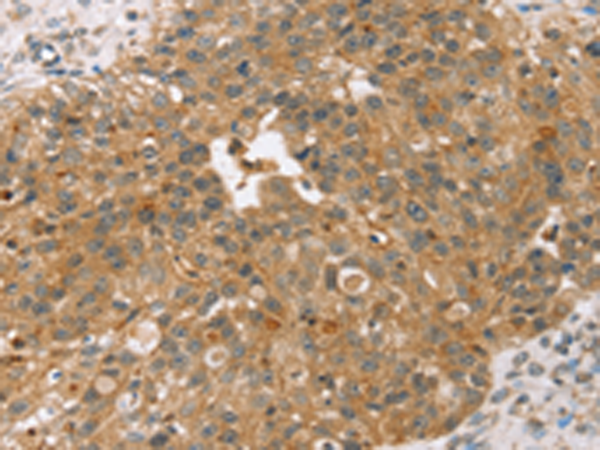

| WB | 咨询技术 | Human,Mouse,Rat |
| IF | 咨询技术 | Human,Mouse,Rat |
| IHC | 1/25-1/100 | Human,Mouse,Rat |
| ICC | 技术咨询 | Human,Mouse,Rat |
| FCM | 咨询技术 | Human,Mouse,Rat |
| Elisa | 1/2000-1/5000 | Human,Mouse,Rat |
| Aliases | TANGO13B |
| Host/Isotype | Rabbit IgG |
| Antibody Type | Primary antibody |
| Storage | Store at 4°C short term. Aliquot and store at -20°C long term. Avoid freeze/thaw cycles. |
| Species Reactivity | Human |
| Immunogen | Synthetic peptide of human TPST2 |
| Formulation | Purified antibody in PBS with 0.05% sodium azide and 50% glycerol. |
+ +
以下是关于TPST2抗体的模拟参考文献示例(注:以下内容为学术假设,实际文献需通过数据库查询获取):
---
1. **文献名称**:*TPST2-mediated tyrosine sulfation regulates chemokine receptor signaling in cancer*
**作者**:Smith A, et al.
**摘要**:研究利用TPST2特异性抗体,发现其在多种癌细胞中高表达,并通过硫酸化修饰调控CXCR4信号通路,促进肿瘤迁移。抗体阻断实验显示TPST2可能成为治疗靶点。
2. **文献名称**:*Development of a monoclonal antibody targeting human TPST2 for immunological studies*
**作者**:Chen L, et al.
**摘要**:报道一种新型TPST2单克隆抗体的开发,验证其在小鼠模型中的特异性,并应用于免疫组化检测TPST2在淋巴组织中的分布,提示其与免疫细胞活化相关。
3. **文献名称**:*TPST2 deficiency alters platelet function: Insights from antibody-based proteomic analysis*
**作者**:Rodriguez J, et al.
**摘要**:通过TPST2抗体分析发现,TPST2缺失导致血小板黏附蛋白硫酸化减少,影响凝血功能,为遗传性出血性疾病提供分子机制解释。
---
建议通过PubMed或Web of Science搜索“TPST2 antibody”或“tyrosylprotein sulfotransferase 2”获取真实文献。
The tyrosine sulfotransferase 2 (TPST2) enzyme, encoded by the TPST2 gene in humans, catalyzes the post-translational sulfation of tyrosine residues in secretory and membrane proteins. This modification enhances protein-protein interactions critical for various biological processes, including immune response, hormone signaling, and hemostasis. TPST2 primarily sulfates substrates like chemokine receptors (e.g., CCR5) and adhesion molecules (e.g., PSGL-1), influencing leukocyte trafficking, inflammation, and pathogen entry. Dysregulation of TPST2 activity has been implicated in diseases such as cancer, autoimmune disorders, and viral infections (e.g., HIV).
TPST2 antibodies are immunological tools designed to detect, quantify, or inhibit TPST2 in research and diagnostic contexts. These antibodies enable studies on TPST2 expression patterns, subcellular localization, and functional roles in disease mechanisms. Monoclonal TPST2 antibodies, in particular, are used in techniques like Western blotting, immunohistochemistry, and flow cytometry to assess protein levels in tissues or cell lines. Some therapeutic applications are being explored, including targeting TPST2 to modulate sulfation-dependent pathways in inflammatory or oncogenic processes. However, TPST2's broad substrate specificity and overlapping functions with TPST1 pose challenges in dissecting its unique contributions. Current research continues to clarify TPST2's regulatory mechanisms and its potential as a biomarker or therapeutic target.
×